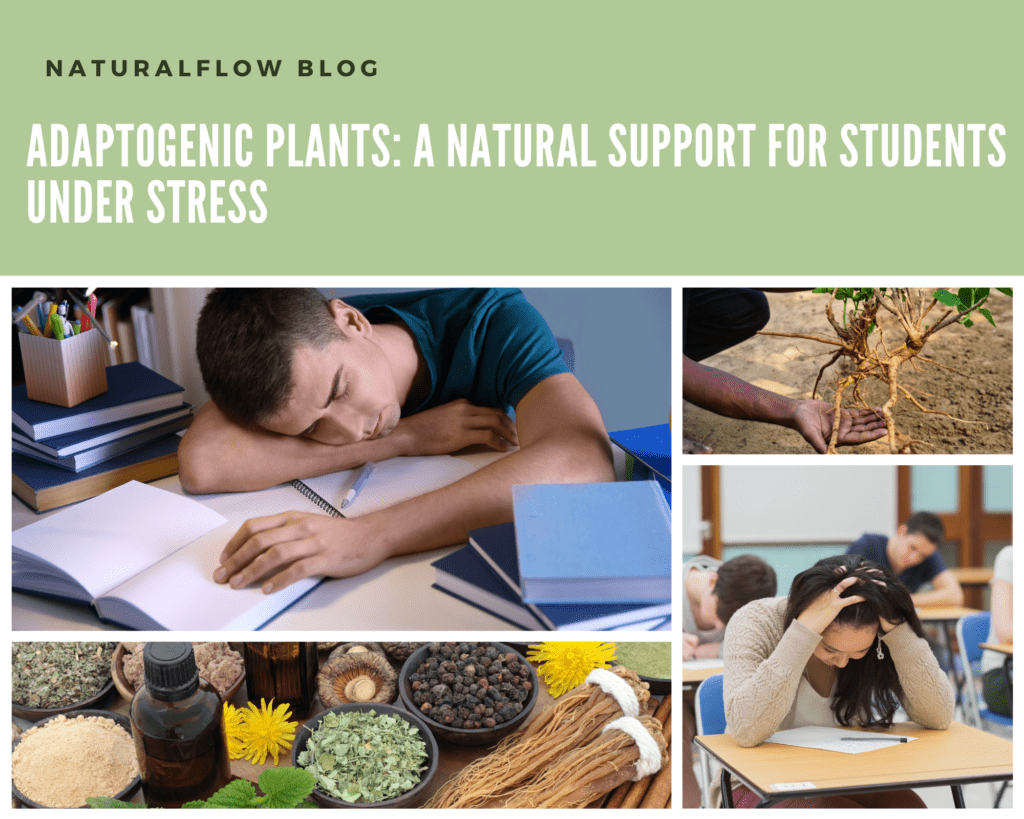
Adaptogenic Plants: A Natural Support for Students Under Stress
Being a student is an experience full of opportunities and satisfaction (hopefully!), but it can also be incredibly demanding.
The pressure of deadlines, the approach of exams, long nights of studying, and high expectations often put both the body and mind under significant strain. During times of intense stress, adaptogenic plants can serve as valuable and natural aids, promoting balance, concentration, and energy.
I chose to dedicate this article to students, particularly during this time of year when exam season amplifies anxiety and concerns about results.
However, the benefits of adaptogenic plants go far beyond the academic sphere: these plants prove to be valuable for anyone facing stressful situations, offering effective support to navigate daily challenges with serenity.
What Are Adaptogenic Plants and What Are Their Benefits for Students?
Adaptogenic plants are natural remedies that help the body respond more effectively to stress, enhancing its adaptability and overall well-being.
They not only mitigate the effects of stress but also promote mental concentration, physical recovery, and increased vitality. These qualities make them ideal allies for students tackling significant cognitive loads and intense schedules.
Mechanisms of Action of Adaptogenic Plants
Adaptogenic plants act primarily through their interaction with the hypothalamus-pituitary-adrenal (HPA) axis, which regulates the body’s response to stress. In stressful situations, they help by:
Modulating cortisol production:
By reducing excess cortisol, the stress hormone, they help prevent exhaustion and anxiety.
Balancing neurotransmitters:
They stimulate substances like serotonin and dopamine, improving mood, memory, and concentration.
Protecting cells from oxidative stress:
Thanks to their bioactive compounds, they mitigate cell damage caused by prolonged physical and mental stress.
These mechanisms are supported by scientific studies validating the efficacy of adaptogens in enhancing physical and psychological resilience.
The Best Adaptogenic Plants for Students
- Rhodiola Rosea: The Root of Resilience
Known for its ability to improve focus and combat mental fatigue, Rhodiola is particularly useful during long study sessions or exam periods.
Benefits: Enhances memory, reduces anxiety, and boosts mental clarity.
Usage: Tinctures, capsules, or teas.
- Ashwagandha: The Herb of Balance
A powerful adaptogen, Ashwagandha helps to calm the mind without causing sedation. It is ideal for managing chronic stress common among students.
Benefits: Reduces cortisol levels, improves sleep, and supports emotional resilience.
Usage: Powder added to smoothies, teas, or capsules.
- Ginseng (Panax Ginseng): The Natural Tonic
Ginseng is perfect for students seeking a natural energy boost and better resistance to fatigue.
Benefits: Increases physical and mental energy while improving decision-making abilities.
Usage: Teas, liquid extracts, or tablets.
- Schisandra Chinensis: The Fruit of Endurance
This plant is recognized for improving focus while protecting the body from the negative effects of stress.
Benefits: Supports liver function and boosts mental energy.
Usage: Infusions, powders, or snacks enriched with Schisandra extracts.
- Tulsi (Holy Basil): The Plant of Serenity
Tulsi, or Holy Basil, is a gentle adaptogen that calms the mind while supporting productivity.
Benefits: Reduces anxiety, enhances mental clarity, and strengthens the immune system.
Usage: Teas or dietary supplements.
How to Incorporate Adaptogenic Plants into a Study Routine
1. Study Teas: Sipping a Tulsi or Rhodiola tea during study sessions can promote focus and relaxation.
2. Daily Supplements: Capsules or extracts of Ashwagandha and Ginseng can be added to your morning routine to support energy and focus.
3. Nutritional Recipes: Use adaptogenic plant powders in smoothies or snacks for natural support throughout the day.
4. Personalized Combinations: Many products combine multiple adaptogens to maximize benefits, such as a mix of Rhodiola and Ashwagandha for energy and calmness.
The Time It Takes for Adaptogenic Plants to Work
Adaptogenic plants take time to fully manifest their benefits, as they act gradually to balance the body and promote homeostasis. Initial effects, such as a slight reduction in stress or an improvement in energy, may be noticeable within a week of regular use. However, for more consistent results—such as increased resistance to stress or improved cognitive functions—a continuous intake for at least 4-6 weeks is necessary. The time required can vary depending on individual metabolism, overall health, and the specific adaptogen used.
The Importance of Choosing High-Quality Products
The quality of adaptogenic products is essential for ensuring both effectiveness and safety. It is crucial to select products made by reliable manufacturers that adhere to strict production standards and ensure the absence of chemical additives, artificial coloring, or preservatives. Opt for organically grown herbs, free from pesticides or synthetic fertilizers, and prefer standardized extracts to guarantee precise concentrations of active ingredients. Additionally, a high-quality product should come with certifications and laboratory analyses confirming its purity and the absence of contaminants such as heavy metals or mycotoxins. This attention to detail protects consumer health and optimizes the benefits of adaptogenic plants.
Conclusion
Adaptogenic plants offer valuable support to students aiming to balance studying, stress, and well-being. By incorporating these herbs into their daily routine, it is possible to approach academic challenges with greater calmness and improve mental performance naturally. With the right balance between work and self-care, success is not only achievable but also sustainable.
Precautions
Adaptogens are generally safe, but it is important to consult a professional before starting, especially if you are taking medications.
Effects may vary from person to person, so monitoring individual responses is recommended.







